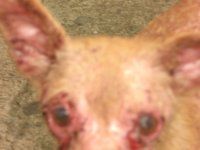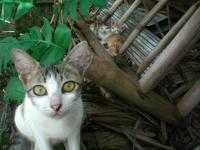Vegetarian Feeding Of Dogs And Cats
Sponsored Links
Many of the clients in my practice are (like myself) strict vegetarians. Their reasons range from an interest in natural health care to concern for cruelty to animals. This lifestyle has proven tremendously beneficial for them and the natural assumption is that a similar nutritional approach would benefit their dogs and cats as well. Personally, I am against feeding vegetarian foods to dogs and cats. My reason is clear and simple — dogs and cats are carnivores! I know that many purveyors of pet products like to paint dogs as omnivores, but their teeth and digestive system are clearly those of a carnivore. If that isn't enough, an hour or two watching nature programs will convince all but the most brainwashed individuals that canines eat an animal based diet.
The reason many people claim that dogs are not strict carnivores is that there is no KNOWN nutrient that a canine cannot obtain or synthesize from plant ingredients. This is a tenuous argument at best. It is only arrogance that leads anyone to believe that he or she knows every nutrient that is needed by any species. It was just a few years ago that the necessity of taurine in the feline diet was discovered. In addition, the fact that the body can manufacture a nutrient does not indicate that a dietary source of that nutrient is not necessary. Perhaps the body's daily need is greater than it can produce. Recent studies bear this out. It has been found that while dogs can manufacture the amino acid carnitine from dietary ingredients, they also urinate out a larger quantity of carnitine than was previously thought. Without a dietary source of carnitine, it is very difficult for a dog to have adequate levels available for healthy muscle function. Carnitine is only found in animal tissues! In felines, the amino acid taurine is a necessary dietary component; it, too, is only found in animal tissue. While both of these amino acids are available as synthetic supplements, I don't believe that is anywhere near the same quality as obtained in a natural diet. There a number of other nutrients known to be necessary for felines such as active vitamin A (which they cannot synthesize at all), which are only found in animal tissues. Perhaps in the future, such nutrients will be discovered for dogs, as well.
Another problem with using vegetarian diets is not what is lacking but what they actually contain. Vegetarian recipes consist mostly of vegetables, grains and soy products. By nature, carnivores eat virtually no grains or soy products. These foods are very high in carbohydrates which are almost unheard of in the wild carnivore's diet. Metabolically, carnivores are not designed to use carbohydrates in such a large quantity. The result is a weakening of the health of the animal and an increased tendency to obesity. I also believe the high carbohydrate content of pet foods (vegetarian or not) leads to dental problems, too.
So why do a growing number of people recommend vegetarian diets for dogs and cats? There are several reasons:
1) Ignorance of their true nature and needs
2) Having an agenda to convert all people and animals to vegetarianism for animals rights reasons
3) Capitalizing monetarily on people following #2.
4) Knowing an animal that has done well on a vegetarian diet
Numbers one, two and three above are self explanatory. Number four may seem contradictory to what I have been saying. Let me try to clarify why a pet's symptoms may improve on a vegetarian diet. When animal protein is cooked as it is in pet food production, they become far more difficult to digest and are more irritating to the immune system. This can result in symptoms such as digestive problems, skin eruptions and a variety of others that may be labeled as a food allergy or a myriad of other diagnoses. When the offending protein is removed from the diet, the symptoms improve. I believe it is the absence of the offending protein not the presence of the vegetarian ingredients that results in the reduction of symptoms. Unfortunately, the lack of proper protein is likely to rear its head later in terms of other health problems. I have yet to see a vegetarian dog or cat that looked as good as a healthy, meat fed one. I know that there are many people out there who have a story to tell about a vegetarian pet who lived to be very old. There are exceptions to every rule, but I wouldn't risk my pet's life on it.
Please take note that I am not insensitive to the problem of animal suffering in the factory farm environment. As a veterinarian, I have seen it personally, and as I said, I am a vegetarian myself. The problem is that if a dog or cat is being fed a vegetarian diet, then that animal is likely to suffer as a result of malnutrition. With either a meat based or vegetable based diet, animal suffering will occur. Do we have the moral right to force our carnivores to suffer on a vegetarian diet because we have made a personal choice for our own lifestyle? For many people, this is a very difficult decision and there is no perfect answer.
- Russell Swift, DVM, Classical Homeopath
Feel Free To Read Another Article
Feel free to read another article or continue exploring the rest of my web site. Remember, you can also visit my question and answers also.
- Holistic Pet Health Articles
- Introduction To Natural Health And Nutrition For Pets
- Nutrition — The Raw Truth
- The Real Poop On Inflammatory Bowel Disease
- Chronic Renal Failure
- Clearing The Air About Flatulence
- Weight Loss: Is Your Pet Ready For Bikini Season?
- Seizure Disorders And Homeopathy
- Homeopathy And Behavioral Problems
- Vegetarian Feeding Of Dogs And Cats
- Pet Allergies
- Thunder and Lightning, Very Frightening, Or Not?
- Blood Tests: But The Tests Were Okay!
- Pet Dentistry: Filling You In On Dental Care
- Holistic Healing: Commitment or Commodity?
- Rimadyl — Wolf In Sheep's Clothing
- Flea Free Naturally
- Of Worms and Germs
- Not All That Itches Are Fleas
- Effects Of Symptom Suppression
- A Homeopath's Perspective On Topical Therapy
- Genes And Proteins: The Stuff Of Life
- Miasms — A Modern Understanding
- Vaccines — Good Medicine Or Bad Advice?
- Herings Law of Healing
- Causes Of Symptoms
- About Dr. Swift, DVM
 Meet Jumbo, the participant in
Meet Jumbo, the participant in 